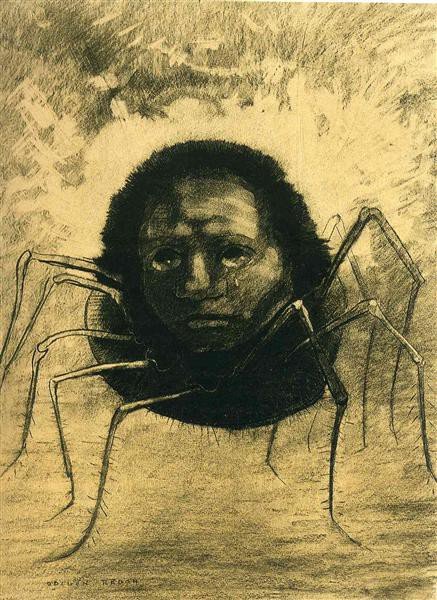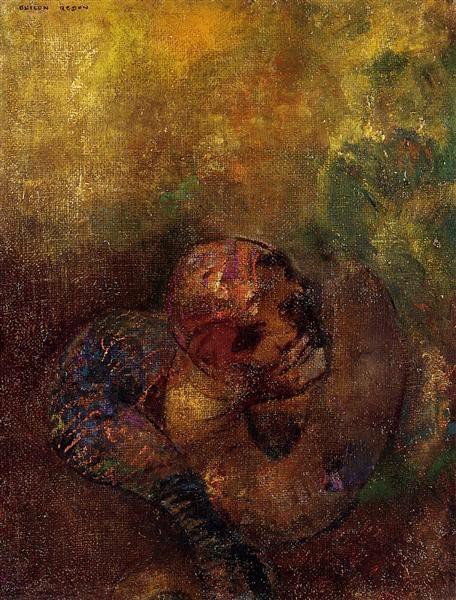I liked A. You couldn’t help but like her. But B frightened me. And this is really more of a B story…

(“Crying Spider”, Odilon Redon 1881)
Hello. My name is Randy. I am an alcoholic. I have been clean for years, but I don’t like to keep count.
Last week I attended a poetry recital. Being an old liar, listening to people spill their guts in public feels like showering. Everyone lies a little bit all the time, and I can’t do that anymore. I never chose to stop drinking. I decided to stop lying.
Two poetesses made stark, contrasting impressions on me. I found out later one had just turned thirty, and the other was a little younger. They both wrote about sex and love.
The older of the two I will call A, the younger, B.
In a poem addressed to the future husband she had yet to meet, A talked about longing for a life-mate, her loneliness, her faults, fighting the darkness she recognized in her own strange desires, her growth, her goals, and her self-conscious habits. She was witty and knew how to work a crowd, pulling us down in mellow empathy — then back up, releasing pent up emotion with a punchline. A good poet can work a crowd of people like a musician in concert. And she did.
I think she will find him, whoever he is. I hope so. I liked A. You couldn’t help but like her.
But B frightened me. And this is really more of a B story.
B was angry. She addressed her “mother, dearest,” in an odd mixture of formality and fury as B reprimanded her for worrying about her daughter’s promiscuity.
B embraced vulgarity, in contrast to A who had used it only once, strategically, and to great effect. Both in style and substance, B was as crude as possible. While it felt deliberate, it did not feel strategic.
Her poetry included a list of the many men she had bedded. How, when, where, how many times, how they had begged her not to leave after. But never why.
At no point was one of the men named, each reduced to a job description alone. She never once talked lovingly about a memory. She never described a lazy summer afternoon in a field, or a desperate winter’s night under the covers in a tiny apartment, huddling together for warmth, comfort and dreams for a better future. She never spoke about denying a kiss in the streets of a strange city from a man she loved deeply because she knew that tasting such unattainable sweetness would ruin her.
It wasn’t a sense of déjà vu, per se, but halfway through I had the sensation that I knew everything B would say before she said it. Everything was pure expression, loud, angry, in your face. Her thoughts felt hurried, and her vocabulary entirely ad hoc. The narrative was easy enough to follow and the point was clear from the get-go, but she spoke it with the intensity of a quarreling lover who is so angry with their partner that communication becomes revenge.
I was rendered both bored and horrified. B framed her anecdotes as a discussion with her mother about “Old Grey Women.” Weak hags, living only to torment their daughters, envious of all they had lost. Lonely, sad creatures reminiscing about when they could overpower men, taking out their self-loathing by slut-shaming their daughters. At once, curiously, blaming them for the self-fulfilling prophecy, and denouncing any negative connotation to being a “slut” in the first place. When she spoke in the voice of an elderly woman living in a nursing home, all she made her say was: “I wish I had fucked a fireman when I was 21.”
B displayed the deconstructed, dismembered bodies of the men she had called lovers in a loveless voice, for the same reason anyone displays beaten corpses to the public: to frighten, scare, and humiliate. She rubbed her mother’s nose in her sex life. Not out of a genuine desire to help her mother turn a new leaf, or to be accepted, or to find common ground. Only to hurt her.
Her overarching and many-times-restated conclusion was that she did not want to become a regretful crone like the “Old Grey Women.” The powers she had written this ode to celebrate—beauty, love, sex—were all secondary. The primary concern was not what she wanted to be, but what she would at all costs avoid becoming. “Like her mother.”
After my parents’ divorce, my mother quickly moved in with mutual friend of theirs. They all solemnly agreed that there were no hard feelings, so that no one lost face.
One day, my dad told me about a recurring dream he had. Both men had worked construction for many years. In the dream, my father was building a house with my mother’s boyfriend. After a lunch break, dad returns to the construction site to see his old acquaintance is wearing his pants. Dad notices just then that he isn’t wearing any. Infuriated, my father murders him with a hammer.
I almost vomited when he told me that story. He insisted that it was only a random series of undecipherable nonsense, but had felt the need to tell someone about it regardless. He couldn’t, or wouldn’t, see it. It’s hard to see your father weak.
Listening to B felt like listening to my father describe that dream.
The picture B had painted of a senior citizen sitting around wallowing in sexual regrets was so absurd that I couldn’t let go of it. She was insistent that there was nothing that could possibly haunt a person more than not fucking a fireman. Not seeing your loved ones die, not living with debilitating disease, not the loneliness of being forgotten and left to rot in a plastic environment by sociopaths pretending to care about you, keeping you alive to extort your relatives. No horror could possibly fill the minds of these “Old Grey Women,” except sexual frustration.
Whenever anyone tries to reduce the world to a single variate, it is a projection. Not that sex was all B could think about. She was not a nymphomaniac. She was scared beyond belief. What I mean is that she was struggling with nihilism. Wrestling with the cultural meme of needing to decide what one’s own values are. The demand that you articulate yourself from nothing, while you are simultaneously weighed down by corporate-enforced relativism in a sea of culturally-endorsed over-indulgence. The problem of Auto-nomen, the Naming of Oneself. Declaring to the world what you are. It is the greatest and hardest task anyone can undertake. It is unfortunately also our first.
In the pit of nihilism, you reach out for anything that makes you feel real. The only thing B said with certainty was that she was sexually attractive, and knowing that youth was fleeting, the inevitable conclusion must be that she will eventually become worthless. And so she looked at her mother, and saw only a failed seductress.
I’ve seen both men and women try to paint the same picture. But the picture is never finished. I don’t think it can be. Descriptions of the ideals of free love, promiscuity, or the hip new notion of polyamory, always fall short. The story is never of a complete and happy person. It’s always about tomorrow, yesterday, and last night. The goal is always somewhere on the horizon. Every “today” is always unhappy. Even if it’s the day you’re standing in front of 80 people doing what you supposedly love.
Beneath the boastful bravado, which I felt little connection to, I felt a sense of empathy with B. But hearing her say what she did, to a crowd of people who applauded robotically in turn, broke my heart. Why would you ever listen to the advice of someone unhappy about how to live a happy life? Unhappy people, even if they are the smartest people in the world, will only ever tell you how to be unhappy — how, in particular, they are unhappy.
Without any sort of plan in mind, I felt compelled, curious. I had to know more. Scared I might be wrong. Scared that I might be right.
I approached B after she came off the stage and introduced myself. I told her that she had moved me, and congratulated her on her performance. She was clever, and articulate, and I told her so.
Then,I panicked. I hadn’t thought it out. Only snippets and beginnings, and vague notions of dread. Without really knowing what I was going to say, I asked her the first thing that came to mind.
“Are you happy?”
Being an old liar sometimes pays off. Makes you pay attention. For just a moment, her jaw clenched, and the tightening of tiny facial muscles betrayed a hint of scowling wrinkles beneath her makeup. She flinched. Not in shock. Not in surprise at the sudden, off-the-cuff question. But in fear.

(“Chrysalis”, Odilon Redon, unknown date)
To the question in your title, my Magic 8-Ball says:
Hi! I'm a bot, and this answer was posted automatically. Check this post out for more information.
Downvoting a post can decrease pending rewards and make it less visible. Common reasons:
Submit
Awesome post. Thank you for sharing.
Downvoting a post can decrease pending rewards and make it less visible. Common reasons:
Submit